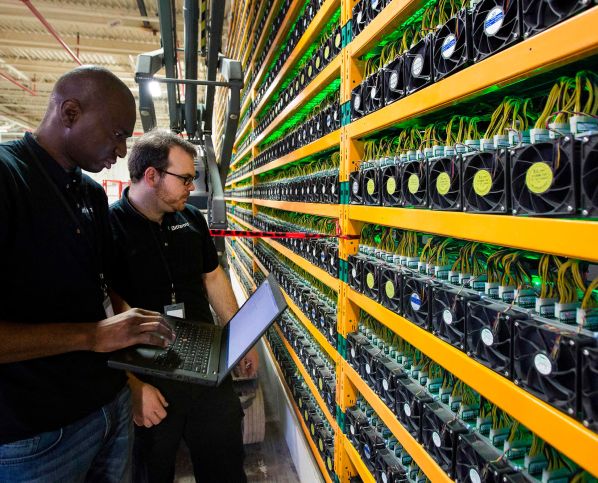Bitcoin miners are scrambling to strike deals with artificial intelligence developers to shore up their flagging revenues by acquiring new customers for their massive data centers.
Cryptominers run high-powered computer centers, often occupying halls of several acres, where they solve complex mathematical puzzles to authenticate transactions and produce digital coins. High energy and computing costs, as well as the rewards for mining have recently been cut in half, leaving many struggling to survive. Now they hope to capitalize on a surge in demand for high-performance chips used in both cryptomining and artificial intelligence processing, such as graphics processing units. Tech companies are almost bidding against each other to get access to Nvidia’s GPUs as they seek to build more powerful artificial intelligence systems and increasingly strike deals that allow them to use miners’ chips or host their own chips in miners’ data centers .
A Core Scientificone of the world’s largest bitcoin mining companies, is “aggressively pursuing” AI deals, CEO Adam Sullivan said. “It’s an incredibly important part of our revenue,” he added. The Nasdaq-listed company has data centers in Texas, North Carolina and Georgia. company entered into an agreement last month with the CoreWeave AI with a cloud service provider that they estimate will bring them $4.7 billion in revenue over 12 years. Nvidia-backed CoreWeave — itself a former cryptominer that turned to AI a few years ago and saw its valuation jump to $19 billion in May — will use Core Scientific’s data centers to house its AI chips.
AI companies require large amounts of power and computing infrastructure, two things that bitcoin miners typically have access to. AI groups believe that using miners’ high-performance computing (HPC) data centers is faster and cheaper than building their own. Big tech companies, including Microsoft, Google and Amazon, plan to spend tens of billions of dollars on developing their data center infrastructure to support their AI ambitions. Demand for AI capabilities has also spurred investor interest in new cloud-based startups like CoreWeave and Lambda Labswhich focus on renting access to GPUs.
You can buy computing capacity with one click
“It typically takes 3-5 years to build an HPC data center from scratch,” JPMorgan analysts wrote in a recent note, adding that this time period has become even longer today due to the increased demand for AI projects. companies that have access to cheap electricity today.”
Other major bitcoin miners are also converting some of their processing capacity to AI. American hedge fund Coatue Management, founded by fund manager Philippe Laffont, recently invested $150 million in Hut 8 to help the bitcoin mining company adapt its infrastructure to meet the needs of AI companies. The mining company also recently created a new AI department. Asher Genoot, chief executive of Hut 8, said the company – which takes its name from a building in Bletchley Park where mathematician Alan Turing worked during World War II – is focused on the “huge demand and growth in the data center segment, driven mainly by the large-scale interest in AI demand driven’.
Bitcoin miners hope that shifting their strategy to AI will provide them with higher and more stable earnings. Many miners, including Core Scientific, went bankrupt in 2022 due to the collapse of the FTX crypto exchange. At the time, the price of bitcoin had fallen below $16,000. Although crypto prices have soared since then — bitcoin hit a record high above $73,800 in March and is currently trading around $63,800 — their financial reward from mining each new block of bitcoin has been reduced by the quadrennial bitcoin halving in April. The high costs of energy and technology also hurt their profitability.

Canadian miner Hive is also focused on “growing revenue from Nvidia’s suite of GPU chips powering services for the AI revolution,” the company said, while New York-based Bit Digital in January signed a $275 million, three-year deal to to lease its data center space to a large language modeling company. “On the verge of the halving, we felt that with margins compressed by 50 percent overnight, there was no point in hoping that bitcoin would go up. It’s just not a good business practice,” said Sam Tabar, CEO of Bit Digital. “We simply we provide computing power to those who build AI models, we deal with the hardware part of this,” he added.
The race to build new data centers is straining power grids around the world, given HPC’s huge energy demands. Bitcoin mining is also extremely energy intensive, and both sectors are criticized for their huge energy consumption. Google’s greenhouse gas emissions have risen 48 percent in the past five years amid expansion of its data centers used for artificial intelligence processes, while data from the University of Cambridge shows that bitcoin mining uses more energy annually than Pakistan or Ukraine.
Source: sg.hu


